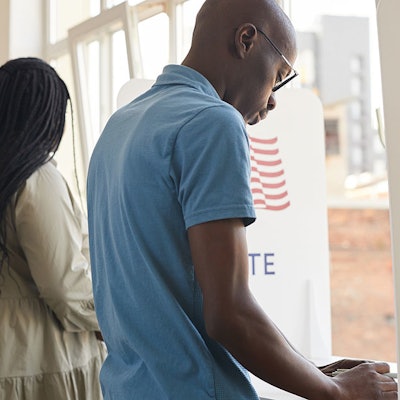Three months ago all of the pundits, media, conservatives were talking about not a red wave but a red tsunami.
But "none of that happened,” said Navin Nayak, president of the Center for American Progress Action Fund, who moderated a panel discussion titled, “The Role of Young Americans in the 2022 Midterms," on Tuesday.
The panelists—Rep. Maxwell Alejandro Frost, the first GenZer to serve in Congress; Cristina Tzintzún Ramirez, president and executive director of NextGen America; and Rachael Russell, associate director, polling and analytics, Navigator Research—discussed the role young people played in the election as well as strategies to engage Americans 18 to 35 in the political process. 
“There is a pattern that has emerged in the last few elections of young people showing up, having their voices heard and shaping the direction of this country,” said Nayak.
Frost noted that his election to Congress shows that GenZ people are getting involved in the political process at a young age. He attributed that to movements over the past several years, such as March for Our Lives. As well as running for election, Frost is a musician and artist, which puts him in contact with various elements of advocacy.
NextGen is approaching its 10-year anniversary, and Ramirez said it was founded on the premise that it could take on the biggest challenges around climate change and income inequality if young people mobilize. “This third election of historic turnout has busted the myth that young people don’t care,” she said. “Young people turned out because they are trying to build a country that’s more just, more inclusive, more fair.”
Nayak noted that two-thirds of young Americans support labor unions. Ramirez, who has experience working with unions, said this is the first generation to be worse off than their parents. She said issues that have been centered in the Democratic party include climate change, racial justice and economic justice.
“The next big frontier is about housing and inequality,” said Ramirez. “Young people are thinking about, ‘Why don’t we judge our economy by how well working people are doing instead of just by the GDP and unemployment figures?’ There has to be a reset of how we think about economic wellbeing.
“We need to do a better job of owning the economic future,” she added. “Unions are going to be central to that.”
Frost said in his organizing, he’s seen that young people see the world through the eyes of the most vulnerable and that informs how they see issues. Nayak pointed out that young voters are not a monolith. Russell said across gender, race and age, polling shows that inflation is a huge issue.
“Making sure that we are thinking about listening to all young voters,” said Russell. “Something we’re thinking about in the polling industry is how we reach young voters.”
Ramirez said the thing people typically think of when they hear “young voter” is a young white person on a college campus.
“That is actually not the majority of who we’re talking to. We need to remember this is the most diverse generation in American history. This is also the most queer generation,” she said. “We have to speak to people’s pain so that they can understand the power they have to make progressive change.”
Frost said while his campaign did conduct organizing on college campuses, there was also a lot of activity outside of that, such as culture- and art-based events. His campaign efforts tended toward community colleges because those students typically live in the community year-round. By reaching those students, organizers also reach the students’ parents.
“The other thing is how we’re communicating with folks who are outside of college. It’s important we meet people where they’re at,” Frost said.
Given the Republican-controlled U.S. House of Representatives, Nayak asked how to keep young people engaged during the next two years, where progressive legislation may not be passed. Frost said organizers must engage young people and keep them informed and feeling connected to what’s going on in Washington, DC.
“Making sure we’re engaging our youth at a young age and not just on college campuses,” said Russell. “Also, implementing pro-voter policies is really important. Making sure we have things like automatic voter registration, mail-in ballots or early voting. These things take down barriers to voting.”
Ramirez said in Texas, where she lives, there is a law that twice a year every high school has to have an opportunity for in-person voter registration, but 60% of high schools do not do it. NextGen is leading an effort toward a national high school voter registration program.
An audience member asked about messaging around student debt cancellation. Russell responded, “Youth voters, I think seven in 10 support student loan debt cancellation. It’s a really popular policy. Not just young voters support the legislation. I think there’s going to be a big fight coming this year with the courts, and something we are definitely watching and hoping to be a resource for.”
Ramirez added, “If everything does move forward in the courts, it’s also a great organizing opportunity to talk to young people. … It’s a huge opportunity to make sure that people understand how they benefit and how their vote translated to that win.”















